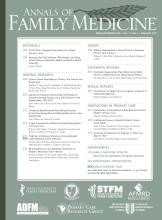Abstract
PURPOSE Many non-Western immigrants report musculoskeletal pains that are hard to treat. We studied the effect of high-dose vitamin D3 on nonspecific persistent musculoskeletal complaints in vitamin D–deficient non-Western immigrants and assessed correlation of pain patterns with benefit.
METHODS We conducted a semi-crossover randomized controlled trial between February 2008 and February 2010 in primary care in 84 non-Western immigrants visiting their general practitioner for nonspecific musculoskeletal pain. At baseline, patients were randomized to placebo or vitamin D (150,000 IU vitamin D3 orally); at week 6, patients in the original vitamin D group were randomized a second time to receive vitamin D (again) or to switch to placebo, whereas patients in the original placebo group were all switched to vitamin D. The main outcome was self-assessed change in pain after the first 6 weeks.
RESULTS Patients in the vitamin D group were significantly more likely than their counterparts in the placebo group to report pain relief 6 weeks after treatment (34.9% vs 19.5%, P = .04). The former were also more likely to report an improved ability to walk stairs (21.0% vs 8.4%, P = .008). Pain pattern was not correlated with the success of treatment. In a nonsignificant trend, patients receiving vitamin D over 12 weeks were more likely to have an improvement than patients receiving it over 6 weeks.
CONCLUSIONS There is a small positive effect 6 weeks after high-dose vitamin D3 on persistent nonspecific musculoskeletal pain. Future research should focus on longer follow-up, higher supplementation doses, and mental health.
- vitamin D
- vitamin deficiency
- immigrants
- musculoskeletal pain
- pain
- supplementation
- primary care
- practice-based research
Footnotes
-
Conflicts of interest: authors report none.
-
Annals Journal Club selection; see inside back cover or http://www.annfammed.org/AJC/.
-
To read or post commentaries in response to this article, see it online at http://www.annfammed.org/content/10/6/547.
- Received for publication October 6, 2011.
- Revision received February 12, 2012.
- Accepted for publication March 1, 2012.
- © 2012 Annals of Family Medicine, Inc.







